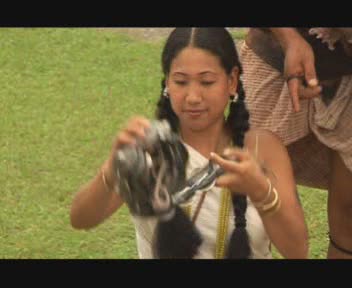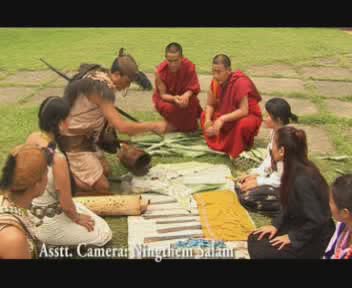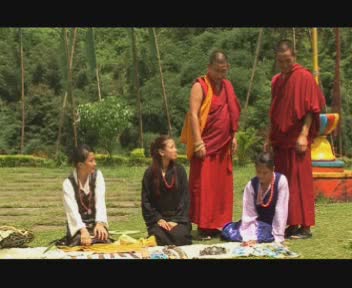
Congress supporters celebrate victory
MIZORAM: ELECTIONS Polls muddy the Church-State divide
By Debarshi Dasgupta
Church As EC?
* The Church released a code of conduct for the Dec 2 assembly polls
* It co-manned election booths with representatives of political parties
* MPF even distributed campaign literature instead of party officials
* The Seventh Day Adventists and Baptists have contested the Presbyterian Church’s role
* Critics say the church has no business meddling in elections
Elections in Mizoram this year have defied norms. Quite contrary to the usual threat of violence that defined them, they were subdued and sterilised because of the involvement of the almighty Church in the election process.
While in the past it has always issued statements outlining its demands and positions, this is the first time a church-backed vigilante group—the Mizoram People Forum (MPF)—stepped in to “oversee the conduct of free and fair elections”.
This has won the Church great praise but also generated unease about a religious institution issuing political diktats and enforcing them by its volunteers.

A copy of the MPF guidelines
Alongside the Election Commission’s code of conduct, the Church issued its own code proscribing, among other things, door-to-door campaigns, organisation of community feasts, use of loudspeakers and music bands.
The MPF even put out guidelines describing an “ideal candidate” as somebody upright and free from corruption and alcoholism. In Mizoram, about 60 per cent of the population adheres to the influential Presbyterian Church that backs MPF.
Explaining the need for the Church’s intervention, moderator of the Mizoram Presbyterian Church Synod (MPCS) Rev H. Vanlalauva says, “In the 2003 polls, there were reports of voters being influenced by money power.
There was also fear of violence and rumours that certain candidates would be kidnapped. To avoid such situations, the church felt the need to step in to ensure peace.”The political class, however, is divided over the Church’s intervention. Unlike some who appreciate its role, BJP state president Kahawvel Thanva alleges the Church supported the Congress that won the elections.
“That always happens with us. Those who lose accuse us of siding with the winners,” says Rev Zosangliana Colney, MPCS’s executive secretary.
Church officials say they neither named any candidate or party, nor did they discriminate on the basis of religion. The code too was framed in consultation with all parties including the BJP and the NCP, they add.
Though the code had no legal binding, offenders, MPF secretary Lalbiakmawia Ngente says, were censured “morally and socially”.
This is a point that rankles Henry Zodinliana Pachau, a lecturer at the Mizoram University in Aizawl. “What’s worrying is that they are determining what is good. I wouldn’t want my freedom to be clipped in the name of religion,” he says.
“Moreover, the Church has no business getting involved in elections. That is the responsibility of the state. Who knows, next elections there may even be a Church party?” he adds.
The Church, especially the MPCS, is a pervasive force in Mizoram where about 87 per cent of the population is Christian.
MPCS’s website says that in 2004-05, it raised Rs 33.5 crore from donors. Of this, only Rs 2.5 lakh came from abroad. Explains Ngente,
“The Mizo society is close-knit and had traditionally sought guidance from its rulers. The Church is now taking over that role.”
For all the talk of the Church being a “supra-state actor”, Mizoram’s chief electoral officer Lalmalsawma argues that MPF’s involvement “supplemented” the state’s role.”Yes, the MPF did play a significant and helpful role but it is not a substitute.
In fact, the Election Commission of India even sent us a congratulatory note for the conduct of the most smooth and peaceful elections ever in Mizoram,” he says.
Should this model of allowing religious institutions an active role in elections be replicated elsewhere? Former CEC James Lyngdoh doesn’t think so. “Almost everyone in Mizoram is a Christian and the Church is so influential that it influences everybody. It is a unique situation,” he says.


















































